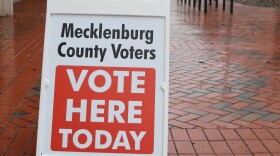The Buncombe County Planning Board held its second listening session Monday night as it considers new restrictions on short-term rentals. More than three dozen local residents spoke during the 90-minute session, which was held on the campus of A-B Tech in Asheville.
The county planning board is considering a proposal that would affect homeowners who rent their property for 30 days or less through platforms such as Airbnb and VRBO. If adopted, the proposed restrictions would apply only in unincorporated parts of the county. The restriction would only limit new short-term rentals and existing rentals would be grandfathered in.
There were 5,268 short-term rentals in Buncombe County in 2022, accounting for about 4.5% of the county’s total housing stock, according to AirDNA data. Short-term rentals in Asheville account for about 20% of that figure. The city imposed its own restrictions on these properties in 2018.
Proponents of the proposed Buncombe County restrictions argue the rules would help address the scarcity of affordable housing. The proposed rules would allow new short-term rentals, or STRs, only in commercial districts and would limit each property to a maximum of 4,000 square feet. Among other restrictions, STRs would not be allowed in manufactured home parks or affordable housing developments.
The rules would not affect “homestays,” or rentals of one or two bedrooms in an owner-occupied property.

At Monday night’s listening session, Chris Joyell, Healthy Communities director for the environmental nonprofit MountainTrue, described the issue as one of supply and demand. Joyell noted the Buncombe County Tourism Development Authority in recent years has spent a significant amount on advertising to attract more tourists.
“When we remove 5,000 units from the housing stock, that’s simple economics,” Joyell said. “That is supply and demand. We are reducing the supply. The demand is being increased every year with TDA’s marketing budget increasing as well, driving more and more people here. We need a solution. This is not the silver bullet, but this certainly helps. This is one of, I think, many solutions that we need in order to make housing more attainable here in Buncombe County.”
Another proponent of the restrictions, Alan Ramirez, spoke on behalf of members of the Emma-Erwin community, where residents are worried about displacement and a dwindling supply of affordable homes, including in manufactured home parks.
“It is indisputable that for communities like ours, short-term rentals remove rental and home-ownership opportunities,” Ramirez said. “For communities in crisis, and for Buncombe County’s housing crisis, it is important to piece together all of the possible tools in order to impact the outcome. There is no single solution to solving the housing crisis, but this is a really important step to getting there.”
Leicester resident Ken Brame spoke on behalf of his homeowners association, noting that short-term rentals in his community have taken affordable homes off the market for middle-class families.
“I understand that most of the 5,000 current facilities would be grandfathered in, which means people are not going to lose their jobs or their livelihood,” he said. “However, I don’t think Buncombe County is going to be better if we have another 5-, 10-, 15,000 vacation rentals put in in our county to take away our opportunities to have good residential neighborhoods.”
The proposed restrictions have been met with vocal pushback from local short-term rental owners, realtors, property managers, cleaning service companies and others. Opponents argue new county rules would negatively impact the local economy and cut off an important income stream for many residents.
“This will damage and cripple everyday people that want to do what they want with their own property,” resident Jay Hamilton said at Monday’s listening session.
“I hope the state steps into this, because we need to have a fair playing field across the state. And right now, the county is effectively taking the right for people to pay for their property in the way that they want to, the dignity to pay their mortgage and to supplement their income.”
Other opponents of the restrictions argued that many of the properties that are being used for short-term rentals would not be considered “affordable” on the market if listed for sale or long-term rent.
“I was hoping that the income would support my medical and living expenses into my old age,” STR owner Byron Greiner said of his property. “My short-term rental is not in the ‘affordable’ category… It does not compete with affordable houses, which is the common thread for this whole thing.”

Another owner, Julie Nelson, said that if the proposed restrictions are enacted, the county would be “changing rules for properties that some of us have owned for many years, bought specifically because of their zoning status.”
“Short-term rentals are not the root cause of Buncombe County’s housing shortage or affordable housing issues, and I know that by living here for 30 years … These same issues have been here for 30 years,” she said.
Some attendees handed out flyers at Monday night’s meeting directing residents to a website where they can “join local industry leaders, property and small-business owners in the fight to save our economy and stop the short-term rental ban.”
Last week, Airbnb sent an email to hosts in the area with the subject line, “Speakout against restrictive rules in Buncombe County.” The email encouraged hosts to email Buncombe County officials and attend Monday night’s listening session.
“In your email, we encourage you to urge the county to reject these rules that would prevent many residents from sharing their home,” the company wrote in the email, a copy of which was obtained by BPR. “Tell county officials about how hosting benefits you, your family and the larger community in Buncombe County.”
On April 1, the proposed language of the new restrictions will be finalized. The Planning Board will then hold one more listening session at A-B Tech on April 22 before presenting its recommendations to the Buncombe County Commission, which is expected to hold a public hearing and potentially take action on the proposal at a later date.
Have questions about STRs? Check out our FAQ.







